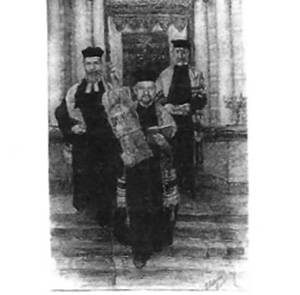


Among Ashkenazi Jews there used to be four different ways of pronouncing the cholam vowel. Two of the four have survived after the Holocaust, namely the one of southern Germany, common in English-speaking countries, and the Polish cholam, widespread in all countries.
The southern German one is pronounced as an “o” like in “go,” and the Polish one as an “o” like in “toy.”
My purpose in my writing this is not to express preference for one or the other, nor to investigate which of the two (or maybe which of the four original) was the first or original pronunciation. If I did (if I could), I am sure I would get a lot of feedback.
I am writing this to tell about my own experience having been brought up in southern Germany, and having lived the first 50 years of my life in a community (Washington Heights) that has always practiced the cholam vowel in that fashion. I knew there were other pronunciations from occasional “outside” contacts, but it was not until 1977, when I moved to New Jersey, that I started to live in a community that practiced the Polish cholam vowel.
Obviously, the majority of the sounds that entered my ears were “Polish” and when I would have the occasion of pronouncing a Hebrew word to others, my pronunciation identified me immediately as a “Yekke.” Even within my family, since not all married within the “Yekke” fold, disagreements of pronunciation sometimes arose.
At no time did I feel that my pronunciation was wrong, and I stuck to the way my parents and my teachers had taught me many years earlier.
It is clear that the southern German pronunciation was widely practiced even outside of that geographic area, as you can see from the banner behind the top table in the illustration. Many Torah leaders, including the Chatham Sofer, continued to speak, daven and lecture, even after they left Germany.
Rav Shimon Schwab, rav of the Breuer’s community for many years, strongly expressed his disagreement with those who deserted their tradition out of embarrassment.
The late mashgiach, Rav Shlomo Wolbe, was asked many times whether it was acceptable that descendants from Ashkenaz change their pronunciation to the one used in today’s yeshivots. His reply was always the same, namely to stick to Ashkenaz, explaining that this was the preferred yeshivish pronunciation of the masters of the Lithuanian Musar movement educated in Kelm.
I want to thank Rabbi Binyomin Shlomo Hamburger of Bnei Brak for allowing me to use his “Shorshei Minhag Ashkenaz” in preparing this article.
I have the habit of always “escorting” the sefer Torah when it is being brought back to the ark, a few steps behind the Torah. Frankly I do not recall when or where I started this custom but I assume it was sometime after I had moved to New Jersey. At Breuer’s nobody but the designated individuals bring the Torah from and to the arc. The Torah is never carried alone, but always accompanied by the gabbai and or the one who has P’sicho and has taken the Torah out, and will place it back into the ark.
At one time I must have noticed that in the shul I was attending, the Torah was not ever, or only sometimes, accompanied by one or more persons. My few steps honoring the Torah were not meant as a replacement of the duty of those responsible, but was just my humble way of showing honor to the Torah. Unfortunately, I often need to squeeze in between others standing around the shulchon, and also often receive questioning stares from them of what I was doing.
Norbert Strauss is a Teaneck resident and Englewood Hospital volunteer.










